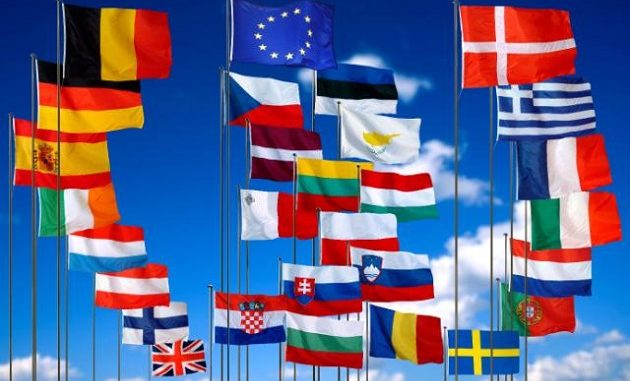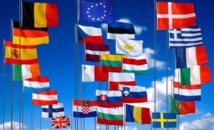"We need China to move on these two issues," the head of the European Union's executive branch said after a video meeting with Chinese President Xi Jinping.
"China has to convince us that it is worth having an investment agreement," von der Leyen stressed. Despite recent progress, much remains to be done, she added.
The European Commission and China have been negotiating on an investment agreement for more than six years.
But the talks hit an impasse earlier this year, with Brussels insisting on more assurances for EU investors wary of conditions for foreign enterprises in China, and on the implementation of the Asian economic powerhouse's climate pledges.
Von der Leyen noted on Monday that there is now agreement in dealing with three areas of EU concern in China: the behaviour of state-owned enterprises; forced technology transfer; and transparency about state subsidies.
According to Chinese state news agency Xinhua, the two partners confirmed on Monday they would speed up talks on the deal, in hopes of concluding a deal before the end of 2020.
Beijing and Brussels are at odds on a host of issues, but also rely on each other in commerce. The EU is China's biggest trading partner, while China is the EU's second-largest trading partner behind the United States.
Beijing for its part is hoping to shore up its ties with Europe as it faces increasing backlash from the United States.
But European leaders feel increased pressure at home to hold China accountable about its human rights abuses, including: the mass internment of ethnic minorities in the western Xinjiang region; the erosion of Hong Kong's freedoms; and Beijing's increased aggression in the South China Sea.
European Council President Charles Michel, who also took part in the talks along with German Chancellor Angela Merkel, said that a number of rights issues were raised on Monday, as well as Beijing's commitment to the Paris climate agreement.
"Real differences exist and we won't paper over them," he said at a press conference in Brussels alongside von der Leyen.
Merkel, who has faced domestic calls to take a tougher line with China, dialled into the talks because Berlin currently holds the rotating EU presidency.
The EU sharply criticized the Hong Kong national security law, passed by Chinese lawmakers in June, which lays down harsh new penalties for crimes including subversion, secessionism and foreign collusion in the financial hub.
Tensions about human rights have spilled into the business world as well.
Joerg Wuttke, president of the European Union Chamber of Commerce in China, said that European companies in China were caught "between a rock and a hard place" when it came to Beijing's track record on human rights.
"Back home, we are forced to have a position on this, otherwise we are penalized by the public and the capital market," Wuttke said.
On the sidelines of the talks, Beijing and Brussels also signed a deal protecting 100 geographical indications for food and drink products in each other's territories on Monday, following up on an agreement struck last year.
From the EU side, the list of 100 products includes delicacies like France's Champagne, Greece's Feta cheese and Italy's Prosciutto di Parma ham.
And from China, specialities like Anji white tea and Panjin rice are to be protected within the 27 countries of the bloc.
EU Agriculture Commissioner Janusz Wojciechowski said the agreement, once in force, would strengthen trading relations and benefit producers and consumers on both sides.
"China has to convince us that it is worth having an investment agreement," von der Leyen stressed. Despite recent progress, much remains to be done, she added.
The European Commission and China have been negotiating on an investment agreement for more than six years.
But the talks hit an impasse earlier this year, with Brussels insisting on more assurances for EU investors wary of conditions for foreign enterprises in China, and on the implementation of the Asian economic powerhouse's climate pledges.
Von der Leyen noted on Monday that there is now agreement in dealing with three areas of EU concern in China: the behaviour of state-owned enterprises; forced technology transfer; and transparency about state subsidies.
According to Chinese state news agency Xinhua, the two partners confirmed on Monday they would speed up talks on the deal, in hopes of concluding a deal before the end of 2020.
Beijing and Brussels are at odds on a host of issues, but also rely on each other in commerce. The EU is China's biggest trading partner, while China is the EU's second-largest trading partner behind the United States.
Beijing for its part is hoping to shore up its ties with Europe as it faces increasing backlash from the United States.
But European leaders feel increased pressure at home to hold China accountable about its human rights abuses, including: the mass internment of ethnic minorities in the western Xinjiang region; the erosion of Hong Kong's freedoms; and Beijing's increased aggression in the South China Sea.
European Council President Charles Michel, who also took part in the talks along with German Chancellor Angela Merkel, said that a number of rights issues were raised on Monday, as well as Beijing's commitment to the Paris climate agreement.
"Real differences exist and we won't paper over them," he said at a press conference in Brussels alongside von der Leyen.
Merkel, who has faced domestic calls to take a tougher line with China, dialled into the talks because Berlin currently holds the rotating EU presidency.
The EU sharply criticized the Hong Kong national security law, passed by Chinese lawmakers in June, which lays down harsh new penalties for crimes including subversion, secessionism and foreign collusion in the financial hub.
Tensions about human rights have spilled into the business world as well.
Joerg Wuttke, president of the European Union Chamber of Commerce in China, said that European companies in China were caught "between a rock and a hard place" when it came to Beijing's track record on human rights.
"Back home, we are forced to have a position on this, otherwise we are penalized by the public and the capital market," Wuttke said.
On the sidelines of the talks, Beijing and Brussels also signed a deal protecting 100 geographical indications for food and drink products in each other's territories on Monday, following up on an agreement struck last year.
From the EU side, the list of 100 products includes delicacies like France's Champagne, Greece's Feta cheese and Italy's Prosciutto di Parma ham.
And from China, specialities like Anji white tea and Panjin rice are to be protected within the 27 countries of the bloc.
EU Agriculture Commissioner Janusz Wojciechowski said the agreement, once in force, would strengthen trading relations and benefit producers and consumers on both sides.









 Home
Home Politics
Politics











